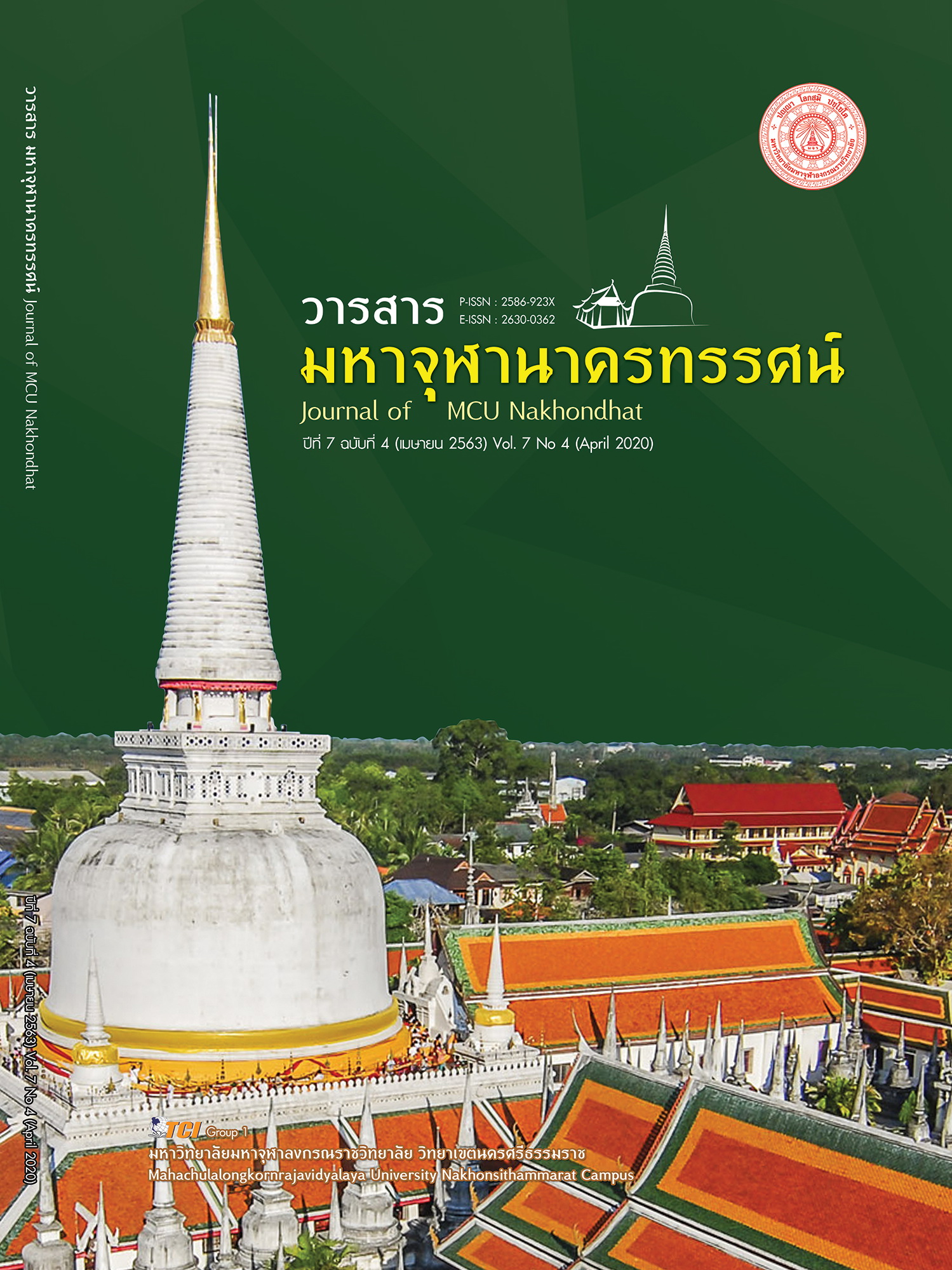AN APPLICATION OF BUDDHIST TEACHINGS FOR LIVING A HOUSEHOLD LIFE AS APPEARED IN AṬṬHAKATHÃ DHAMMAPADA IN THE PRESENT SOCIETY
Main Article Content
Abstract
This thesis entitled ‘An application of Buddhist teachings for living a household life as appeared in Aṭṭhakathã Dhammapada in the present society’ has three objectives: 1) to study the states of problem in living household life in the present society, 2) to study ten kinds of Ovãda given by a wealthy man named Dhanajaya as appeared in Aṭṭhakathã Dhammapada concerning with living a household life, and 3) to study the application of ten kinds of Ovãda given by a wealthy man named Dhanajaya concerning with living a household life in the present society. This is a qualitative research focusing on documentary research based on Tipiṭaka of Mahachulalongkornrãjavidyãlaya University, a Thai version, including commentaries, sub-commentaries, texts, documents, theses, and related research works of Buddhist scholars. In this research, interview of leaders of family members in the area of Municipality of Chaison sub-district, Chaison District, Phattalung province.
In the research, it was found that: 1) In the present society, the principle of living a household life and states of its problem were found that most of features of household life have been influenced upon by the flow of globalization and technological advancement including modern technology whereby most of Thai families have been encountering with rapid changing situations affecting both internal and external family, community, society and environment especially the changing spheres of economics. All of these factors have been greatly affecting upon Thai family as a whole resulting in creating various kinds of family where family members come to change their ways of living life and thereby bringing about various problems to Thai society. 2) The principles of ten kinds of Ovãda given by a wealthy man named Dhanajaya as appeared in Aṭṭhakathã Dhammapada were regarded as the puzzle of Buddhist teachings that he taught to his daughter named Visãkhã before marrying her husband; those teachings were told to her as the good etiquette for a lady whereby she could live her household life in the proper manners. In them, they were concerned about women’s duty while living in a husband’s family; she should behave in the ways that happiness and stability of such a family could be brought in. Those ten kinds of admonition are as follows: 2.1) the internal fire should not be taken out, 2.2) the external fire should not be taken in, 2.3) one should offer to whoever offers in return, 2.4) one should not offer to whoever does not offer in return, 2.5) one should not to whoever offers in return and whoever does not offer in return, 2.6) one should sit happily, 2.7) one should sleep happily, 2.8) one should eat happily, 2.9) one should worship fire, and 2.10) one should pay due respect to deity. 3) In the application of Buddhist teachings for living a household life as appeared in Aṭṭhakathã Dhammapada in the present society, this research was found that to provide certain knowledge and understanding on ten kinds of Ovãda in order to live a household life in the present society is of important aspect because it can promote the stability of family life where the clear-cut guidelines could be made. Once properly followed, the present family would not face any conflict but harmony where all members of family come to understand their role and duty and thereby living a household life in the suitable manners, be it elder or younger, father and mother from both sides. Under this situation, loving kindness and harmony could be actualized inside the family leading to a society’s benefit as a whole respectively.
Article Details
References
แผนกตำรา. (2525). อันตรคาถาธรรมบทแปล ภาค 3 . กรุงเทพมหานคร: โรงพิมพ์มหามกุฏราชวิทยาลัย.
ดิเรก นุ่นกล่ำ. (2559). พระพุทธศาสนากับการพัฒนาสถาบันครอบครัว. ใน สารนิพนธ์พุทธศาสตรบัณฑิต สาขาวิชาภาษาอังกฤษ. มหาวิทยาลัยมหาจุฬาลงกรณราชวิทยาลัย.
พรรณพิลาศ กุลดิลก. (2560). การขับเคลื่อนสังคมผ่านสื่อใหม่ในยุคโลกาภิวัตน์. วารสารวิชาการมนุษยศาสตร์และสังคมศาสตร์, 25(49), 59-77.
พระมหาบุญเพียร ปุญฺญวิริโย (แก้ววงศ์น้อย). (2544). แนวคิดและวิธีการขัดเกลาทางสังคมในสถาบันครอบครัวตามแนวพระพุทธศาสนา. ใน วิทยานิพนธ์พุทธศาสตรมหาบัณฑิต สาขาวิชาพระพุทธศาสนา. มหาจุฬาลงกรณราชวิทยาลัย.
พระวิทูล สนฺตจิตฺโต. (2557). การวิเคราะห์หลักจริยศาสตร์สำหรับแก้ปัญหาการครองเรือนในสังคมไทย. วารสารบัณฑิตศึกษามหาจุฬาขอนแก่น, 1(1), 12-22.
ภิรมย์ บุญยิ้ม. (2544). การศึกษาหลักการเลือกคู่ในคัมภีร์พระพุทธศาสนาเถรวาท. ใน วิทยานิพนธ์พุทธศาสตรมหาบัณฑิต สาขาวิชาพระพุทธศาสนา. มหาจุฬาลงกรณราชวิทยาลัย.
วนัญญา แก้วแก้วปาน. (2560). สัมพันธภาพครอบครัวกับปัญหาการกระทำผิดในวัยรุ่น. Veridian E-Journal Silpakorn University, 10(1), 361-371.
วรารัชต์ มหามนตรี. (2557). โครงการโลกทัศน์ของคนไทยจากภาษิต. ใน รายงานวิจัย. มหาวิทยาลัยนเรศวร.
สมภาร พรมทา. (2548). พุทธปรัชญา: มนุษย์สังคม และ ปัญหาจริยธรรม. (พิมพ์ครั้งที่ 2). กรุงเทพมหานคร: ศยาม.
สุภาวดี ขุนทองจันทร์. (2559). ความสัมพันธ์ระหว่างโลกาภิวัตน์กับค่านิยมพื้นฐานในสังคมไทย. วารสารมนุษยศาสตร์และสังคมศาสตร์ มหาวิทยาลัยราชภัฏอุบลราชธานี, 7(1), 160-185.
หนึ่งฤทัย ขอผลกลาง. (2550). ปัจจัยแห่งการดำรงอยู่หรือล่มสลายของครอบครัว. ใน รายงานวิจัย. มหาวิทยาลัยเทคโนโลยีสุรนารี.


